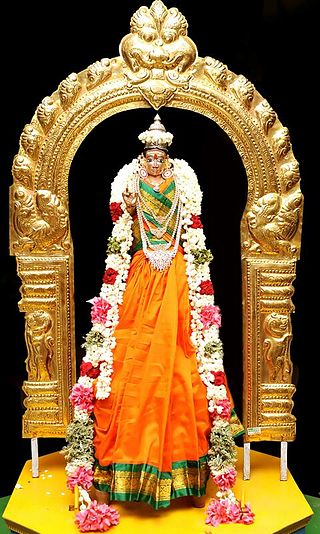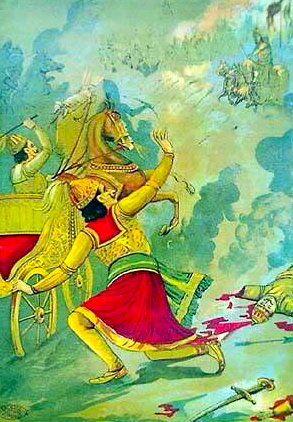This article needs additional citations for verification .(August 2018) |
Barbaras were barbarians who were mentioned in the Indian epic Mahabharata, [1] along with the Yavanas, Sakas and Kambojas.
This article needs additional citations for verification .(August 2018) |
Barbaras were barbarians who were mentioned in the Indian epic Mahabharata, [1] along with the Yavanas, Sakas and Kambojas.

The Mahābhārata is one of the two major Sanskrit epics of ancient India in Hinduism, the other being the Rāmāyaṇa. It narrates the struggle between two groups of cousins in the Kurukshetra War and the fates of the Kaurava and the Pāṇḍava princes and their successors.

Draupadi, also referred to as Krishnaa, Panchali, and Yajnaseni, is the main female protagonist of the Hindu epic Mahabharata, and the common consort of the five Pandava brothers—Yudhishthira, Bhima, Arjuna, Nakula, and Sahadeva. She is noted for her beauty, courage, and a rare polyandrous marriage.

Abhimanyu is a warrior from the ancient Hindu epic Mahabharata. He was the son of Arjuna, the third of the Pandavas and the hero of the epic, and Subhadra, the younger sister of the revered Hindu deity Krishna. Abhimanyu is portrayed as a young, strong and talented warrior. He was also one of the few individuals, along with his father, who knew the technique to enter Chakravyuha, a powerful military formation.

Karna, also known as Vasusena, Anga-raja, and Radheya, is one of the main protagonists of the Hindu epic Mahābhārata. He is the son of the sun god Surya and princess Kunti, and thus a demigod of royal birth. Kunti was granted the boon to bear a child with desired divine qualities from the gods and without much knowledge, Kunti invoked the sun god to confirm it if it was true indeed. Karna was secretly born to an unmarried Kunti in her teenage years, fearing outrage and backlash from society over her premarital pregnancy, Kunti had no choice but to abandon the newly born Karna adrift in a basket on the Ganges, in the hope that he finds foster parents. The basket is discovered, and Karna is adopted and raised by foster Sūta parents named Radha and Adhiratha Nandana of the charioteer and poet profession working for king Dhritarashtra.

In the Hindu epic Mahabharata, Nakula was the fourth of the five Pandava brothers. Nakula and Sahadeva were twins blessed to Madri, by the Ashvini Kumaras, the divine physicians. Their parents — Pandu and Madri - died early, so the twins were adopted by their step-mother, Kunti and were trained by Drona in Hastinapura.

Shakuni is one of the antagonists of the Hindu epic Mahabharata. He was the prince of the kingdom of Gandhara when introduced, later becoming its king after the death of his father, Subala. He was the brother of Gandhari and the maternal uncle of the Kauravas.

The Kurukshetra War, also called the Mahabharata War, is a war described in the Mahabharata . The conflict arose from a dynastic succession struggle between two groups of cousins, the Kauravas and the Pandavas, for the throne of Hastinapura. The war laid the foundation for the Bhagavad Gita.

The Harivamsa is an important work of Sanskrit literature, containing 16,374 shlokas, mostly in the anustubh metre. The text is also known as the Harivamsa Purana. This text is believed to be a khila to the Mahabharata and is traditionally ascribed to Vyasa. The most celebrated commentary of the Mahabharata by Neelakantha Chaturdhara, the Bharata Bhava Deepa also covers the Harivamsa. According to a traditional version of the Mahabharata, the Harivamsa is divided into two parvas (books) and 12,000 verses. These are included with the eighteen parvas of the Mahabharata. The Critical Edition has three parvas and 5,965 verses.

Bharata is a legendary king featured in Hindu literature. He is a member of the Chandravamsha dynasty, and becomes the Chakravarti. He is regarded to be the ancestor of the Pandavas, the Kauravas, Brihadhrata, and Jarasandha. The Bhāratas, a prominent historical tribe mentioned in the Rigveda, are regarded in Hinduism to be the descendants of Bharata.

Kosala Proper or simply Kosala is the kingdom of the celebrated personality of Treta Yuga, Raghava Rama. Ayodhya was its capital, presently in Ayodhya district, Uttar Pradesh. Rama's sons Lava (Ramayana) and Kusha inherited parts of this kingdom. Lava ruled from the city called Shravasti and Kusa from the city called Kushavati. A colony of Kosala kings existed in Madhya Pradesh. It was called Dakshina Kosala. Rama's mother Kausalya was from this kingdom. King Rama extended his influence up to the island-kingdom of Lanka situated in the southern ocean. He had friendly relations with the southern kingdom of forest dwellers (Vanaras) called Kishkindha.
Sauvīra was an ancient kingdom of the lower Indus Valley mentioned in the Late Vedic and early Buddhist literature and the Hindu epic Mahabharata. It is often mentioned alongside the Sindhu Kingdom. Its capital city was Roruka, identified with present-day Aror/Rohri in Sindh, mentioned in the Buddhist literature as a major trading center. According to the Mahabharata, Jayadratha was the king of the Sindhus, Sauviras and Sivis, having conquered Sauvira and Sivi, two kingdoms close to the Sindhu kingdom. Jayadratha was an ally of Duryodhana and the husband of Duryodhana's sister Dussala. The kingdom of Sauvira is also stated to be close to the Dwaraka and Anarta kingdoms. According to Bhagwat Puran Sauviras were once connected with Abhira.

Uttarā is a princess in Hindu Epic. In the Mahabharata, she is described to be the daughter of Queen Sudeshna and King Virata, at whose court the Pandavas spent a year in concealment during their exile. She was the sister of Uttara and Shankha.

In Hinduism, an astra was a supernatural weapon, presided over by a specific deity and imbued with spiritual and occult powers that caused its effect or impact. Later the word came to denote any weapon which was used by releasing it from one's hand, compared to keeping it one's hand (Shastra). In Ramayana and Mahabharata, Rama had more astras than any other warrior. It is believed that Rama possessed all astras. Various texts have stated that Arjuna possessed almost all astras except Narayanastra.

The Adi Parva or The Book of the Beginning is the first of eighteen books of the Mahabharata. "Ādi" in Sanskrit means "first".

The Karna Parva, or the Book of Karna, is the eighth of eighteen books of the Indian Epic Mahabharata. Karna Parva traditionally has 96 chapters. The critical edition of Karna Parv has 69 chapters

The Sauptika Parva, or the "Book of the Sleepers," is the tenth of eighteen books of the Indian Epic Mahabharata. Sauptika Parva traditionally has 2 parts and 18 chapters, as does the critical edition.

The Shanti Parva is the twelfth of eighteen books of the Indian Epic Mahabharata. It traditionally has 3 parts and 365 chapters. The critical edition has 3 parts and 353 chapters. It is the longest book among the eighteen books of the epic.

Svargarohana Parva or the Book of the Ascent to Heaven, is the last of eighteen books of the Indian epic Mahabharata. It traditionally has 6 chapters. The critical edition has 5 chapters. It is one of the shortest books in the Mahabharata.

The Stri Parva, or the "Book of the Women," is the eleventh of eighteen books of the Indian Epic Mahabharata. It traditionally has 4 parts and 27 chapters, as does the critical edition.